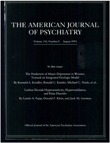Cocaine-induced paranoia and psychosis proneness
Abstract
OBJECTIVE: The aim of this study was to determine whether individuals who experience transient cocaine-induced paranoia are vulnerable to psychosis. METHOD: The subjects were 20 cocaine-dependent men who had been using more than 5 g of cocaine per week and were undergoing substance abuse treatment; half reported binge-limited cocaine-induced paranoia. The men were assessed with the Perceptual Aberration Scale and the Magical Ideation Scale, self-report measures of symptoms thought to precede the development of functional psychosis. RESULTS: The combined scores on the Perceptual Aberration Scale and Magical Ideation Scale were strongly correlated with a history of cocaine- induced paranoia. The sensitivity, specificity, and positive and negative predictive power were 80.0%, 90.0%, 88.9%, and 81.8%, respectively. CONCLUSIONS: Heavy cocaine users who experience transient paranoia while intoxicated may be at higher risk for development of psychosis than cocaine users who do not experience paranoia.
Access content
To read the fulltext, please use one of the options below to sign in or purchase access.- Personal login
- Institutional Login
- Sign in via OpenAthens
- Register for access
-
Please login/register if you wish to pair your device and check access availability.
Not a subscriber?
PsychiatryOnline subscription options offer access to the DSM-5 library, books, journals, CME, and patient resources. This all-in-one virtual library provides psychiatrists and mental health professionals with key resources for diagnosis, treatment, research, and professional development.
Need more help? PsychiatryOnline Customer Service may be reached by emailing [email protected] or by calling 800-368-5777 (in the U.S.) or 703-907-7322 (outside the U.S.).



